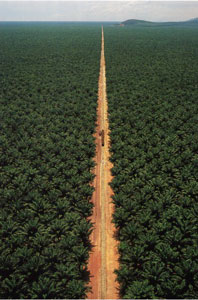
In yet another example of Europe getting farther out ahead of the US when it comes to renewable energy. The Dutch are already thinking about sustainable biofuels. They want to make sure that we don’t chop the rain forest down, or starve people in Africa so that the developed world can power their cars.
“We all know that biomass potentially can play an important role in sustainable energy production,” said Environment Minister Jacqueline Cramer. “But the question is: How do you do that in a way that is truly sustainable?”
The scheme makes the Netherlands a front-runner among nations seeking to tackle the new climate change dilemma. Other European countries are working along similar lines and are closely watching the Dutch initiative – the first to reach the level of government consideration.
The Dutch panel, called the Cramer Commission because the environment minister chaired it before being appointed to the Cabinet, has drawn up a framework which companies can use to measure the sustainability of crops used for biofuels.
The framework evaluates emission reduction compared with fossil fuels and whether the crops supplant other land uses such as food production. It also looks at whether the crops reduce biodiversity, damage the environment or use pesticides.
Dutch companies can check some of the criteria, but the government and independent monitoring also will have to ensure they are being met, said Cramer.(via)
Without a system like this in place world wide biofuels will continue to be produced at the expense of habitat and food supplies. The only good biofuel is a sustainable one.
The ‘Cramer Criteria’ were written in consultation with a consortium of Dutch organisations, including oil major Shell and multinational Unilever, who both oppose the introduction of biofuels, for obvious reasons. Environment Minister Jacqueline Cramer received the report which recommended stringent criteria for the use of biomass materials such as grains, sugar and cellulose, increasingly used to generate power and produce biofuel. The report proposes that Dutch companies who import these feedstocks must prove, via a certifiable track and trace system, that the products comply with the following criteria (for the period between 2007-2010) (some comments by Biopact in italics):
* ‘CO2 balance of the biofuel’: the balance is calculated across the entire chain (field to fuel tank/power plant, including CO2 released during transport from the South to the Netherlands). For biofuels used for electricity production, a minimal CO2 reduction of 50% must be obtained; for liquid biofuels a minimal reduction of 30% (this means that Dutch companies cannot import ethanol made from corn as it is currently produced in, for example, the US; nor biodiesel made from rapeseed as it is currently produced in, for example, Canada and China; both these fuels have a CO2 balance that does not meet the 30% reduction target; ironically, none of the biofuels produced domestically in the Netherlands achieve a 30% reduction, but the Cramer Criteria only deal with imported biofuels)
* ‘Food security’: there should be no local food scarcity in the location from which the biomass is sourced, nor scarcity of energy, medicines and building materials because of biomass production (this causality criterium – that scarcity of one of these goods was caused because of biomass production – will be extremely difficult to prove, because it requires an entire analysis of the local economy and its trade flows)
* ‘Nature and biodiversity’: biomass importing companies must report on the effects of biomass production on biodiversity; there should be no impacts on ‘valuable’ protected nature reserves and conservation areas (countries in the developing world regularly change the status of protected areas to exploit them economically; it is of course their sovereign right to do so, but the question is: are the Dutch criteria applicable to areas the Dutch themselves consider to be ‘valuable’ or do they apply to such areas as they are defined by the host country or by international organisations?)
* ‘Welfare and wellbeing’: biomass importers must report on the social effects of the biomass they source or produce in the host country; basic local rights must be respected (it will be very difficult to measure social effects of welfare and wellbeing; in principle, it is possible to imagine a scenario in which biomass production has immediate and perceived negative effects on the welfare and wellbeing because of the way it is produced, but increased incomes for local people may negate these and result in positive longterm effects, such as less poverty, better social services, higher incomes; the temporality of these effects is a major problem (they occur only a long time after a project is initiated); moreover, taxes paid to governments by biomass producing companies are invested in the welfare of the people of the country as a whole, making it extremely difficult to measure these macro-economic impacts)
* ‘Labor’: labor conditions conform to local laws, workers must have the right to organise themselves in a union (these are standard ILO criteria to which all companies doing business in the South should adhere)
* ‘Environmental care’: biomass producing companies must abide by all local environmental laws with regard to pollution, noise, odor and emissions control and fertiliser management (“compliance with US GMO laws” was removed from the final text because it would have implied that genetically modified bioenergy crops are allowed)
* ‘Soil quality and nutrient balances’: all biomass producers must comply with local regulations dealing with the preservation of soil quality; moreover, they may not contribute to soil erosion and must even improve the quality of soils (these criteria are more stringent that those applied to agriculture in the EU or the US)
* ‘Water quality’ : all biomass producers must comply with local laws regarding water quality(via)